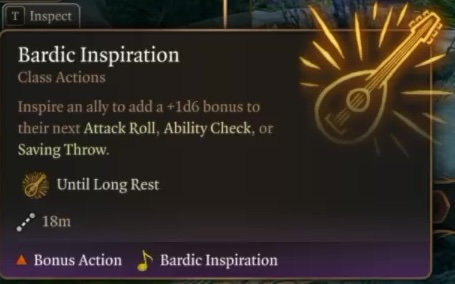Baldur's Gate 3: Bard guide BG3
Would you like to learn how to create a Bard in Baldur's Gate 3? This page of our guide will help you create an optimal build.
Last update:
The Bards, who revere art and knowledge, are one of the most versatile classes available in Baldur's Gate 3. Proficiency in the use of spells, incredibly useful class abilities based on abilities, or efficiency in strengthening allies makes them ideal companions when traveling through the Forgotten Realms. The following page will help you understand the basic principles of the Bard class, making your first steps as this class easier.
- Best race for a Bard
- Ability points
- Best origin for Bard
- Bardic Inspiration
- Song of Rest
- Jack of all Trades and Expertise
- Best spells for Bard
- Best subclass for Bard
- Best build for Bard
Best race for a Bard
The most important ability for a Bard is definitely Charisma. There are several races offering a modifier to this ability, which can be a good starting point for creating the perfect Bard:
- Lightfoot Halfling offers +1 to Charisma, and +2 to Dexterity. Additionally, Halflings' racial ability of allows them to reroll a one rolled on the dice once a day.
- Half-Elf will provide you with +2 to Charisma and +1 to any other two abilities.
- Tiefling - both subraces offer +2 to Charisma and provide a number of interesting racial abilities such as Hellish Resistance.
- Human - a safe and flexible choice offering +1 to all abilities (including Charisma).
Ability Points
When allocating ability points, first pay attention to Charisma, since the strength of your spells depends on it. The flexible nature of the Bard class will ensure that it performs well in many tasks, so the subsequent abilities will depend on your play style. Among the options, however, you can consider:
- Dexterity, since it will nicely complement the Bard's proficiency in defensive throws related to this ability. It will also positively affect your skills with light and medium armor.
- Constitution will provide you with some additional hit points, as well as help in maintaining focus while casting specific spells.
Best origin for Bard
Your Bard's origin should correspond with their high Charisma and Dexterity. Interesting options include:
- Urchin, offering proficiency in Sleight of Hand and Stealth. These, in turn, will come in handy if your party lacks a Rogue or if you are faced with a task that requires cunning and finesse.
- Criminal - this origin will give you proficiency in Stealth and Deception, which will complement your Bard's abilities.
Bardic Inspiration

Bard's class skill. An action, during which your Bard inspires nearby allies. Inspiration provides them a 1d6 bonus to their next attack roll, skill check, and defense roll. At level 5, the inspiration modifier changes to 1d8.
The number of uses of Bardic Inspiration is equal to the Bard's Charisma modifier. After using all charges, the ability will become available again after a long rest. At level 5, you acquire the skill Font of Inspiration, which allows you to regain skill charges after a short rest.
Song of Rest
Class skill unlocked at level 2. The soothing song allows the party to regenerate as if they had a short rest. Especially useful in combination with, for example, a Warlock, who recovers part of the spell slots during a short rest.
Jack of all Trades and Expertise
The Bard's versatility is probably shown best by his ability you receive at level 2. Jack of all Trades allows you to add half of your proficiency bonus (rounded down) to any skill roll in which your character is not proficient.
Proficiency is also related to Expertise, which the Bard gains access to at level 3. With it, you can choose 2 skills in which your character is already proficient. From now on, for every check related to these skills, your proficiency bonus will be doubled.
Best spells for Bard
The wide range of spells available to the Bard makes this class useful in many situations. Here is a list of several interesting spells worth considering:
Cantrips:
- Vicious Mockery - a series of unpleasant comments that inflict 1d4 psychic damage to the target and gives them a penalty to their next attack.
- Friends - enchant a person to gain advantage on Charisma skill checks against the target.
- Minor Illusion - creates a small illusion that distracts nearby creatures. Useful for diverting attention.
Spells:
- Heroism - the Bard or allied companion cannot be frightened, and they also gain 5 temporary hit points every turn.
- Tasha's Hideous Laughter - the target falls to the ground in hysterical laughter. They are exposed to attacks from opponents.
- Healing Word - a simple healing spell restoring 1d4 hit points through eye contact. Useful as a backup healing option for your party.
- Disguise Self - allows to temporarily change the character's appearance. Useful for outsmarting other creatures.
- Feather Fall - fall down slower. The target does not receive damage from falling.
- Blindness - a level 2 spell that blinds the opponent.
- Calm Emotions - all humanoid creatures within the spell's range become resistant to being frightened and charmed.
- Lesser Restoration - a level 2 spell that removes negative effects and poison from the target. Especially useful when the party lacks another healer (Cleric, Druid).
- Fear - a level 3 spell that creates an image so terrifying that the target drops whatever they are holding to the ground and becomes frightened. Exceptionally useful for crowd control during combat.
- Stinking Cloud - the spell creates a paralyzing, stinking cloud. Creatures within its range cannot perform actions.
Best subclass for Bard
After the full release of Baldur's Gate 3, the Bard will have a choice between 3 subclasses, known as Colleges. Each of them has their own set of special abilities and will fit a different play style.
- College of Lore - a subclass focused on acquiring knowledge and extensive skills. By choosing it at level 3, your Bard will immediately gain proficiency in the following skills: Arcana Knowledge, Intimidation, Sleight of Hand. The special ability of the College of Lore, Cutting Words, allows the hero to use a charge of Bardic Inspiration to impose a -1d6 penalty on the opponent (increases at subsequent levels) to one of their next throws.
- College of Valor - a specialization focused on strengthening the party during combat. Choosing it gives the Bard access to the so-called Combat Inspiration. From now on, companions who received Inspiration will be able to add a bonus 1d6 (higher at subsequent levels) to the damage dealt with an attack and to their temporary armor class. The subclass's proficiency in using medium armor, shield, and martial weapons will also make the Bard of the College of Valor able to do well on the front line.
The College of Swords subclass will be added in the full version on August 3rd. The materials presented below are illustrative in nature and based on pre-release promotional materials. The section will be updated after the game's release.
- College of Swords - a subclass for Bards wishing to show their fencing skills. Choosing this specialization will give your character access to Battle Styles similar to those of the Paladin or Hunter. The other abilities will provide you with additional speed during battle, or proficiency in using a chosen type of weapon.
Best build for Bard
As a summary, we present below an exemplary build for a level 3 Bard:
- Race: Tiefling
- Subclass: College of Lore
- Origin: Criminal
- Abilities: Charisma and Dexterity around 16, Constitution around 14, Wisdom around 13/12, Intelligence around 10, Strength around 8.
A detailed description of the build we recommend for this character can be found on the Best Build for Bard page in our guide.
You are not permitted to copy any image, text or info from this page. This site is not associated with and/or endorsed by the developers and the publishers. All logos and images are copyrighted by their respective owners.
Copyright © 2000 - 2025 Webedia Polska SA for gamepressure.com, unofficial game guides, walkthroughs, secrets, game tips, maps & strategies for top games.








